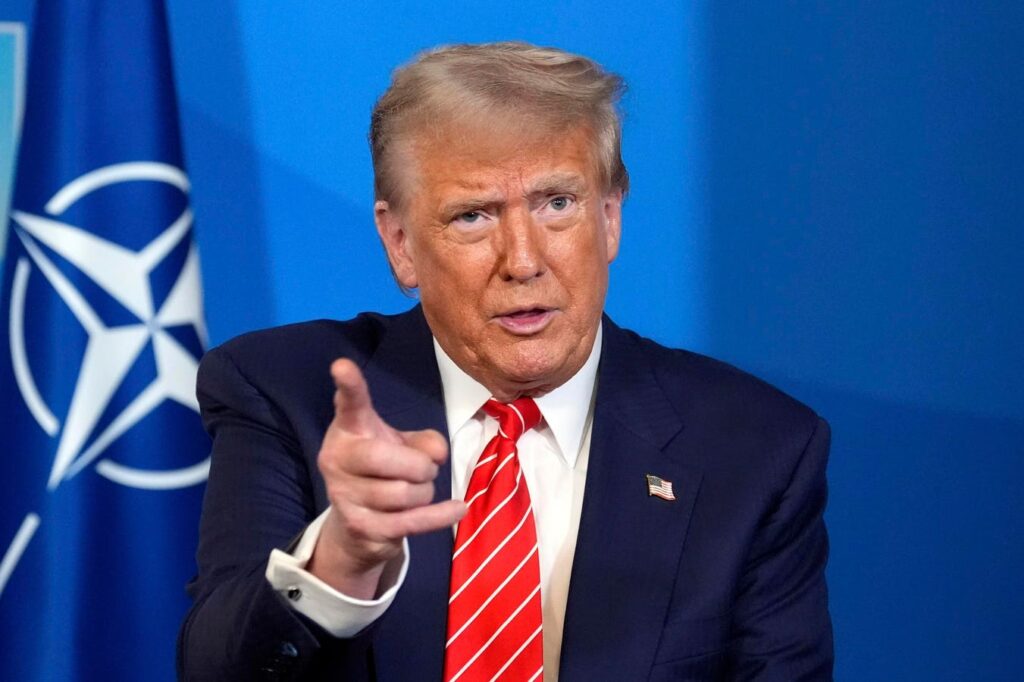
President Donald Trump announced on Wednesday that the United States and Iran will engage in talks next week to discuss a potential nuclear agreement. This announcement follows U.S. military strikes on Iranian nuclear sites, which Trump claims led to a “complete obliteration” of Iran’s nuclear capabilities and effectively “ended the war” between Israel and Iran.
Speaking at a meeting with NATO Secretary General Mark Rutte in The Hague, Trump disputed reports from U.S. intelligence assessments that suggested the bombings only temporarily set back Iran’s nuclear program. He emphasized that the U.S. would be meeting with Iran to discuss terms similar to previous demands, stating, “We want no nuclear, but we destroyed the nuclear.”
U.S. Strikes and Their Aftermath
The White House released a statement supporting Trump’s assertions, describing the strikes as “highly successful.” The Israel Atomic Energy Commission also praised the U.S. action, claiming it had rendered the Fordow enrichment facility inoperable. However, intelligence reports have been less conclusive, suggesting that the damage may not be as extensive as claimed by the administration.
Trump compared the impact of the strikes to the bombings of Hiroshima and Nagasaki during World War II, dismissing claims that Iran managed to relocate enriched uranium before the strikes. “They didn’t have a chance to get anything out,” he insisted, highlighting the speed and decisiveness of the U.S. action.
Media Reactions and Political Fallout
In response to reports from the New York Times and CNN questioning the extent of the damage, Trump took to Truth Social to denounce the outlets as “FAKE NEWS.” He accused them of attempting to undermine what he described as one of the most successful military operations in history.
Steve Witkoff, the president’s Special Envoy to the Middle East, appeared on Fox News to refute the reports, asserting that the strikes had indeed breached the Fordow facility. He criticized the leaking of information as “treasonous” and called for accountability.
International and Domestic Reactions
Iranian Foreign Minister Abbas Araghchi, speaking to Al-Araby al-Jadeed, indicated that Iran would not return to negotiations if U.S. “aggression” continued. Meanwhile, Israel’s military chief, Eyal Zamir, stated that while a significant phase of their campaign against Iran had concluded, focus would now shift back to Gaza and dismantling Hamas.
Trump criticized both Israel and Iran for ceasefire violations, expressing frustration with Israel’s military actions following the U.S.-brokered ceasefire. He urged restraint, particularly from Israel, which he claimed had launched an aggressive bombing mission despite the agreement.
Ceasefire Developments and Global Reactions
Despite the tensions, a ceasefire was announced, with Trump stating that both sides agreed to a “Complete and Total CEASEFIRE” within the next 24 hours. Iranian state media, however, portrayed the ceasefire as a result of their successful missile attacks and claimed Trump had pleaded for peace.
The strikes and subsequent ceasefire have drawn international criticism. Russian President Vladimir Putin condemned the U.S. actions as “unprovoked aggression,” while China criticized the strikes as violations of international law, escalating tensions in the Middle East.
Domestically, the situation has led to heightened security measures in U.S. cities, with Miami briefly shutting down its Metrorail due to a suspicious package. The Israeli military continues to target routes leading to Iran’s nuclear facilities, aiming to obstruct access.
Looking Ahead
As the U.S. prepares for talks with Iran, the global community watches closely. The outcome of these negotiations could significantly impact the geopolitical landscape, particularly in the Middle East. With tensions still high, the effectiveness of the ceasefire and the potential for a lasting agreement remain uncertain.
The developments underscore the complexity of international relations and the challenges of achieving peace in a region marked by longstanding conflicts. As the situation evolves, the world awaits the next steps from both the U.S. and Iran.




